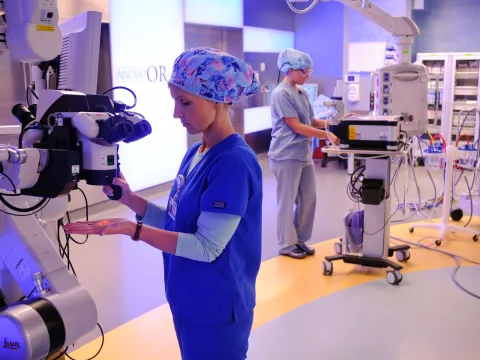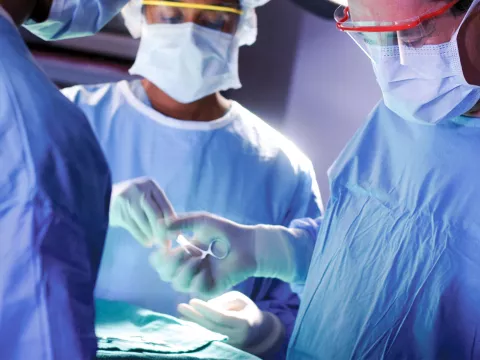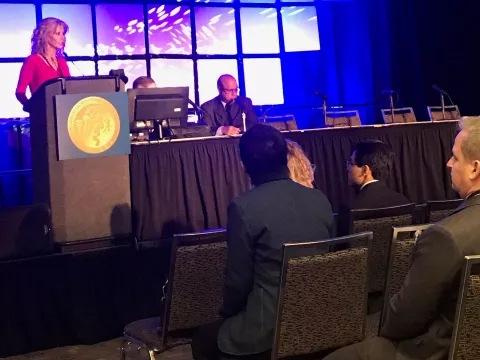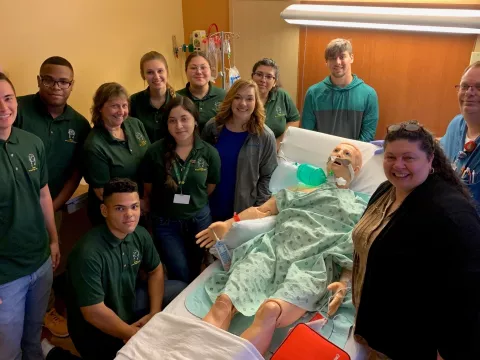- AdventHealth Digestive Health Institute

According to the American Cancer Society, metastatic liver cancer, or cancer that has spread to the liver from the part of the body where it originated, is the most common form of liver cancer, with colon and rectal cancer being the most common source of origin. In fact, the latest medical studies show that 20 to 30 percent of patients with colon and rectal cancers either have a metastatic liver tumor at the time of initial diagnosis or will develop one.
Surgical resection offers the opportunity for definitive treatment of metastatic liver tumors, but currently most liver and colorectal resections are undertaken using a conventional open approach that involves large incisions in the abdomen and requires separate operations to resect the colon and then the liver. Recovery from these two separate procedures often delays the administration of adjuvant chemotherapy for 12 or more weeks, and in some cases, leaves liver lesions unresected for 15 weeks or longer.
To avoid delays in treatment, the experts at AdventHealth Digestive Health Institute (DHI) are at the forefront in the adoption and application of robotic surgery for conditions of the digestive system. The complexity of advanced stage liver and colorectal surgery requires a comprehensive approach and deep experience. Utilizing the robotic system, surgeons at DHI offer the latest and most advanced, minimally invasive options. With hepatic and colorectal surgeons highly experienced in the use of the robotic technology, DHI offers resection of the liver metastasis and colorectal cancer within the same surgical session. In addition to being more convenient for patients, this approach has the added benefits of a single recovery period surgical resection of all cancer tumors as soon as possible.
The benefits of robotic surgery
Robotic surgery is one of the most innovative advancements in medicine, permitting more procedures to be undertaken as closed, minimally invasive surgeries. AdventHealth Tampa has invested in the latest da Vinci® Surgical System, allowing our expert physicians to remove liver and colorectal tumors of all sizes with extreme precision through a series of small incisions.
Patients who have robotic surgery can expect significant benefits, such as:
- Shorter hospital stays. Most liver resection patients are discharged within two to three days following surgery.
- Reduced postoperative complications. Cardiac and pulmonary complications following surgery are significantly lower than in cases involving a large, open incision and more invasive techniques. Risks of wound infections and the development of hernias are also greatly reduced.
- Reduced blood loss. Less blood is lost during robotic surgery, and the need for blood transfusions before and following surgery is greatly minimized.
- Less scarring and less pain. Because the incisions are smaller and the surgical procedure is more targeted, most patients report minimal pain and/or do not require as much pain medication throughout their recovery period as they otherwise would.
- Expedited recovery. Patients can return to work, family and social activities, and normal daily functions much faster than with traditional open surgery.
- Expedited care process. Patients whose care plan involves chemotherapy or other post-surgical interventions can move into these phases of treatment sooner.
In addition, a robotic approach allows for the examination of the entire abdominal cavity for tumors and surface lesions often not seen on a CT scan. Robotic surgery also permits direct liver ultrasonographic assessment that increases the detection of lesions by 10 percent (as compared to CT scan and MRI), leading to better outcomes.
Liver tumor Surgery v. ablation
In most cases, surgery is the preferred and most effective treatment approach to liver metastases, but it is not the only option. Ablation is often promoted as a solution for lesions of the liver, but some multi-institutional studies indicate that the rate of recurrence is far greater with ablation than with surgery, especially for lesions greater than three centimeters in length. However, for select patients, after a thorough preoperative evaluation, ablation may be deemed the most appropriate course of action, and DHI offers a laparoscopic single-incision option for this.
DHI’s multidisciplinary approach
The best treatment path for each patient is determined by DHI surgeons in conjunction with a weekly multidisciplinary conference with medical oncology, radiation oncology, radiology and pathology. A close relationship with Florida Cancer Specialists allows the Digestive Health Institute to offer a complete continuum of care, from neoadjuvant therapy and radiation therapy to surgical treatment by both hepatic and colorectal surgeons, and back to the medical and radiation oncologists.
Experts in complex hepatic and colorectal surgery
Meet Dr. Iswanto Sucandy, Advanced HPB Surgeon
The Digestive Health Institute provides priority access for patients who have been newly diagnosed with cancer. To refer a patient or to learn more about robotic surgical solutions for liver cancer, please call Call813-615-7030.
Recent News

Dr. Sharona B. Ross, MD, FACS Is Meritoriously Named A ‘Patient Preferred Surgeon’ Representing The State Of Florida For 2020
For her dedication and excellence in patient care, Patient Preferred Physicians and Practitioners proudly named Dr. Sharona B. Ross, MD, FACS, a Patient Preferred Surgeon for upper gastrointestinal...

Two Digestive Health Institute Hepatopancreatobiliary (HPB) Surgeons Present At American College Of Surgeons’ Clinical Congress 2019
AdventHealth Digestive Health Institute (DHI) surgeons Sharona Ross, MD, FACS, and Iswanto Sucandy, MD, FACS, gave presentations at the Clinical Congress 2019 of the American College of Surgeons (ACS)...

Dr. Alexander Rosemurgy Makes The Case For Expanding Access To Robotic Surgery
Alexander Rosemurgy, MD, FACS, an advanced foregut and HPB surgeon at AdventHealth Digestive Health Institute (DHI), spoke at the 4th annual Intuitive 360 conference.

World-Class Surgical Treatment Options For Colon And Rectal Cancer With Metastasis To The Liver
According to the American Cancer Society, metastatic liver cancer, or cancer that has spread to the liver from the part of the body where it originated, is the most common form of liver cancer, with...

Robotic Whipple Results In Faster Recoveries And Better Outcomes For Patients
Sharona Ross, MD, FACS, advanced HPB surgeon with AdventHealth Tampa gave a podium presentation today at the 2019 Society of Gastrointestinal and Endoscopic Surgery (SAGES) meeting in Baltimore, MD...

Dr. Sharona Ross Video Presentation Accepted Into 13th IHPBA World Congress
The International Hepato-Pancreato-Biliary Association will be hosting its 13thIHPBA World Congress in Geneva, Switzerland from Tuesday, September 4th, 2018 to Friday, September 7th, 2018.

Florida Hospital Tampa Participates In Lustgarten Foundation Fundraiser
This past weekend, our team participated in the Lustgarten Foundation Pancreatic Cancer Research Walk in Tampa Bay.

Dr. Sharona Ross Recognized At Women In Surgery Career Symposium
The Women in Surgery Career Symposium took place last weekend, February 16ththrough 18th, at the Wyndham Grand Hotel in Clearwater Beach.

Dr. Ross Attends Southeastern Surgical Congress Robotics Course As Faculty
The Southeastern Surgical Congress (SESC) was recently held at the CAMLS Simulations Center in Tampa, Florida, bringing together some of the greatest minds in surgical fields from around the country.

American College Of Surgeons Conference
Dr. Sharona Ross of the AdventHealth Digestive Health Institute was invited to present at the American College of Surgeons conference in San Diego this week.

Best Program Features Doctors Ross, Rosemurgy and Sucandy As Teachers
The B.E.S.T. Academy is a four-week training, mentoring, and educational program for up-and-coming students.

STEM Woman Of The Year Award By Girls, Inc. Given To Dr. Sharona Ross
Girls, Inc. is a nationwide organization that works diligently to ensure that the young girls and women of America are not missing important economic, education, and employment opportunities,
